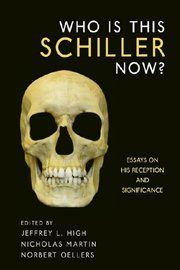Book contents
- Frontmatter
- Contents
- Foreword
- Acknowledgments
- List of Abbreviations
- Introduction: Why Is This Schiller [Still] in the United States?
- Part I Schiller, Drama, and Poetry
- Part II Schiller, Aesthetics, and Philosophy
- Part III Schiller, History, and Politics
- Part IV Schiller Reception — Reception and Schiller
- 17 Schiller and the Gothic — Reception and Reality
- 18 Schiller's Plays on the British Stage, 1797–1825
- 19 From Martyr to Vampire: The Figure of Mary Stuart in Drama from Vondel to Swinburne
- 20 A Chapter of Schiller in America: The First World War and Volume 3 of Kuno Francke's Edition of The German Classics
- 21 The Reluctant Recruit? Schiller in the Trenches, 1914–1918
- 22 Schiller — Kommerell — George. Eine Konstellation der Moderne
- 23 Was sagte dieser Schiller (damals)? Schillers Antworten auf seine Kritiker nach 1945
- Part V Schiller Now
- Notes on the Contributors
- Index
22 - Schiller — Kommerell — George. Eine Konstellation der Moderne
from Part IV - Schiller Reception — Reception and Schiller
Published online by Cambridge University Press: 05 February 2013
- Frontmatter
- Contents
- Foreword
- Acknowledgments
- List of Abbreviations
- Introduction: Why Is This Schiller [Still] in the United States?
- Part I Schiller, Drama, and Poetry
- Part II Schiller, Aesthetics, and Philosophy
- Part III Schiller, History, and Politics
- Part IV Schiller Reception — Reception and Schiller
- 17 Schiller and the Gothic — Reception and Reality
- 18 Schiller's Plays on the British Stage, 1797–1825
- 19 From Martyr to Vampire: The Figure of Mary Stuart in Drama from Vondel to Swinburne
- 20 A Chapter of Schiller in America: The First World War and Volume 3 of Kuno Francke's Edition of The German Classics
- 21 The Reluctant Recruit? Schiller in the Trenches, 1914–1918
- 22 Schiller — Kommerell — George. Eine Konstellation der Moderne
- 23 Was sagte dieser Schiller (damals)? Schillers Antworten auf seine Kritiker nach 1945
- Part V Schiller Now
- Notes on the Contributors
- Index
Summary
The article analyzes Max Kommerell's understanding of Schiller as laid out in his early study Der Dichter als Führer in der Deutschen Klassik (The Poet as Führer in German Classicism, 1928). Kommerell analyzes the Weimar friendship between Goethe and Schiller from the perspective of “Einflussangst” (mutual fear of influence, H. Bloom), which likewise mirrors the strained relationships within the circle of Stefan George in his own time. The manifestations of Schiller's quest to maintain his own identity versus the “daemon” of Goethe reflect Kommerell's increasingly ambivalent feelings toward the “master” George. Embarking from this observation, the thesis develops that his book on German Classicism is no longer representative of Kommerell the orthodox Georgean, but rather of the “apostate” who was to emancipate himself in 1930.
ALS DER FRANKFURTER PRIVATDOZENT Max Kommerell im November 1934 in Bonn1 anlässlich der Feiern zu Schillers 175. Geburtstag eine Festrede, “Schiller als Gestalter des Handelnden Menschen”, zu halten hat, setzt auch er mit der Frage nach Schillers Aktualität ein: “Vielleicht hat sich Schiller die Frage: ‘Wer bin ich?’ nie gestellt, nicht weil er ihr auswich, sondern weil sie ihn nicht bekümmerte: Eher die andere: ‘Was soll ich sein?’ und die noch dringendere: ‘Was soll ich tun?’” (GB, 132). Für Kommerell ist Schillers “Wirkung unter den Deutschen […]” nicht nur Effekt der Rezeption, ‘Wirkung’ ist geradezu integraler Bestandteil des Werkkalküls selbst. Sie beginnt, schreibt Kommerell weiter, “im Gedichteten selbst, das ein Wille zu wirken, hervorbrachte” (GB, 132).
- Type
- Chapter
- Information
- Who Is This Schiller Now?Essays on his Reception and Significance, pp. 367 - 382Publisher: Boydell & BrewerPrint publication year: 2011



